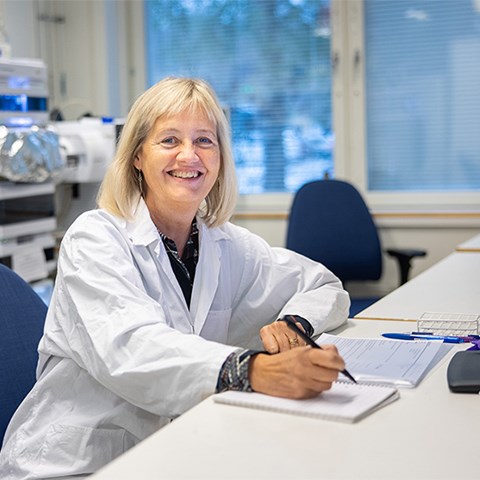What made you become interested in science?
Karin Ljung: I believe I have always been interested in natural sciences, especially biology. Some of my other interests when I was young was astronomy and paleontology (read dinosaurs), and I always liked mathematics. My parents were very supportive, although they never had a chance to study themselves. We spent much of our free time in our cottage and in the forest, fishing, picking berries and mushrooms etc. When I started my biology studies at Umeå University, I also got very interested in the chemistry part of the education, and my research interests since then have been at the intersection between biology and chemistry.
You worked for a long time as a research engineer before you started your PhD. What motivated you to take this step?
Karin Ljung: Coming from a family with no academic traditions and living in a small town in northern Sweden, I did not have any good role models and examples for an academic career. So, it was really a big step for me to do a PhD. Finally, I realized that I was stupid not to do so. I was fortunate at that time to be working in a research group at UPSC with a very good supervisor and mentor, Professor Göran Sandberg. He gave me all the support and freedom that I needed to pursue a research career, and he has been a real source of inspiration for me.
What kind of obstacles did you have to overcome during your career? What has helped you in your career?
Karin Ljung: I feel that the main obstacles have been my background and my introvert personality, that made me feel very uncertain of my potential. I have worked really hard to overcome my natural shyness and to become bolder. I’m not sure that I have succeeded though, but at least I have improved.
One reason that I have been working at the same department since 2000 is that the Department of Forest Genetics and Plant Physiology was and is a great place to work at, with a really supportive and friendly atmosphere. When I started my own research group in 2005, I also received monetary support from the UPSC Berzelii Centre, especially focused on supporting early career female group leaders. This support, as well as the continuous support from Kempestiftelserna, has been instrumental for me in order to establish and develop my independent research group at UPSC.
Do you think that more gender equality benefits science?
Karin Ljung: Definitely, diversity is always positive, and all workplaces benefit from better gender equality. Still, there are many obstacles that need to be tackled, especially for women. Science is very competitive, and we need to make it possible for young scientists to combine family life with research, and make sure that they get continuous support to be productive during their whole research career.
Since 2007, UPSC is working on achieving its goal of 40-60 percent women at all career stages and currently 45 percent of the group leaders are female. How did you experience this development throughout the years?
Karin Ljung: It has been very positive! When I started, very few women were group leaders and professors. Also, UPSC was not the international workplace that it is now. I am very happy with the recruitments that we have made at UPSC during the recent years. We now have a group of early and middle career scientists that are very skilled and productive, and I’m confident that they will continue to keep UPSC at the forefront of plant biology.
What do you think we can do to inspire the next generation of women in science?
Karin Ljung: Good role models are very important, and we need to show that it is possible (and fun!) to do research. There are very few jobs that have the same amount of freedom as research, and it is important not to kill enthusiasm and creativity with “new public management”.
For six years you have been the head of the Department of Forest Genetics and Plant Physiology at UPSC. Do you have any suggestions to the current UPSC management to improve gender equality at UPSC?
Karin Ljung: We need to have good recruitment strategies to attract top researchers to UPSC, and there are many excellent women in that group. Continued support for young researchers is also very important, there are always periods in research careers when funding is running low, and it can be difficult to be productive. Also, it is important that teaching and academic housework is spread even between men and women, in order to benefit, instead of being an obstacle, for their careers.
Read more about Karin Ljungs research at the UPSC web site
